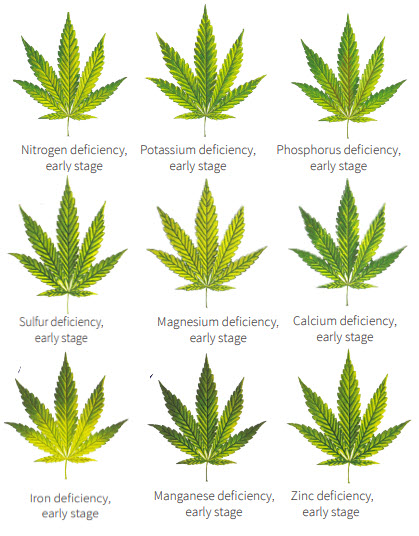How to identify cannabis nutrient deficiencies at an early stage
Cannabis nutrient deficiencies are something that many growers encounter. The ability to identify nutrient deficiencies at an early stage is important to be able to take corrective measures quickly. Deficiencies present themselves in different ways depending on the nutrient that is deficient. It’s important to identify them correctly and ensure that your plants get the proper level of nutrients to stay healthy. It’s even more important to know how to prevent them.
Below, we’ll discuss how to identify early signs of cannabis nutrient deficiencies during the Vegetative Stage. We then outline the best fertilizers to use early in your production program.
3 Common Vegetative Stage Nutrient Deficiencies in Cannabis
A common mistake growers make is not adjusting the type and level of cannabis water-soluble fertilizer they give to plants as they grow. Cannabis plants require different levels of nutrients depending on their growth cycle stage. Failure to adjust nutrient ratios and rates could have negative impacts on your plants. During the early stages of growth, it’s particularly important to ensure you are providing the appropriate nutrients to set your crop up for success during the flowering phase.
1. Early Nitrogen Deficiencies in Cannabis Plants
Nitrogen deficiency is commonly observed during the vegetative phase, usually due to feeding insufficient levels. The main indicator of nitrogen deficiency is a progressive yellowing of leaves, beginning at the lower parts of the plant and gradually spreading upwards towards the top.
2. Early Magnesium Deficiencies in Cannabis Plants
While magnesium deficiencies primarily manifest during the flowering phase, they can also occur in the vegetative phase when nutrient ratios are imbalanced. The symptoms of magnesium deficiency are evident on the leaves as interveinal yellowing, as opposed to the overall yellowing observed in nitrogen deficiencies. Small, rusty brown spots and/or cloudy yellow flecks appear in the middle-aged leaves.
3. Early Calcium Deficiencies in Cannabis Plants
Calcium is another nutrient that is commonly deficient during the flowering phase but can start during the vegetative phase. Much like magnesium, the common cause is due to a nutrient imbalance within your fertilizer blend or program. Symptoms begin in older leaves as spots with sharp outlines that appear at the edge of the leaf.

Some deficiencies in cannabis plants are more common during the vegetative phase compared to the flowering phase. So, it’s important to look for the above deficiencies in your vegetative plants, including mother stock.
If you believe you are experiencing a cannabis nutrient deficiency, it is best to send samples of foliar tissue demonstrating symptoms for testing. A foliar nutrient analysis will be able to confirm your suspicions and ensure that you are taking the right corrective action.
Preventing Early-Stage Cannabis Nutrient Deficiencies
Plant-Prod offers a variety of water-soluble cannabis fertilizers. The key is to know which ones to use during the early growth stages. We recommend the following to avoid nutrient deficiencies:
1. Plant-Prod MJ™ Boost Water-Soluble Cannabis Fertilizer
Use this during week one and week four of the growth schedule. Plant-Prod MJTM Boost 15-30-15 is a specialized water-soluble cannabis fertilizer designed for cannabis transplants and promoting bud growth. This formulation is rich in phosphorus, providing the necessary nutrients for healthy transplants and robust bud development. It is highly soluble, ensuring efficient absorption by the plants. Importantly, it has a low salt index and does not contain sulphates or harmful chlorides, making it safe for young transplants.
2. Plant-Prod MJ™ Grow Water Soluble Cannabis Fertilizer
Use this during weeks two and three of the growth schedule. Plant-Prod MJTM Grow 12-8-26 is a water-soluble cannabis fertilizer specially designed for the vegetative growth phase of cannabis plants. It provides a well-balanced ratio of nitrogen, phosphorus, and potassium, which is essential for promoting optimal growth and establishing a strong plant structure capable of supporting desired yields. The inclusion of magnesium helps prevent any signs of cannabis deficiency.
3. Plant-Prod MJTM Cal Kick Water Soluble Cannabis Fertilizer
Use this beginning in week three and continue into the flowering phase. Plant-Prod MJTM Cal Kick 15-0-14 is a high calcium formulation that should be used as the main source of calcium when levels in the water source are not adequate. Calcium is vital to plant rigidity and bud formation. This formulation contains a full micronutrient package with added EDDHA iron to avoid signs of deficiency when used in rotation.
It is important to note that even when using the appropriate water-soluble cannabis fertilizer blend at the right rate, cannabis nutrient deficiencies can occur due to inappropriate media pH levels. This is known as “lock-out” and should be addressed in a different manner. Frequent media and nutrient run-off monitoring are an important part of any cannabis production program.
For more fertilizer productivity tips, check out these blog posts:
- Will plants recover from fertilizer or nutrient burn? Signs and symptoms you can’t afford to ignore
- How To Fix Calcium Nutrient Deficiency in Cannabis Plants
- The Problem With Hyperaccumulators: How to tell if you have contaminants in your Cannabis product.
Plant-Prod manufactures cannabis water-soluble fertilizers for cannabis. The choice of growers from California to Maine for over 70 years, Plant-Prod fertilizers are made from the finest raw ingredients in the world, tested constantly for purity and turbo-milled to ensure 100% solubility in order to help you improve yields while cutting fertilizer costs. Click here to find a Plant-Prod cannabis fertilizer supplier near you.

